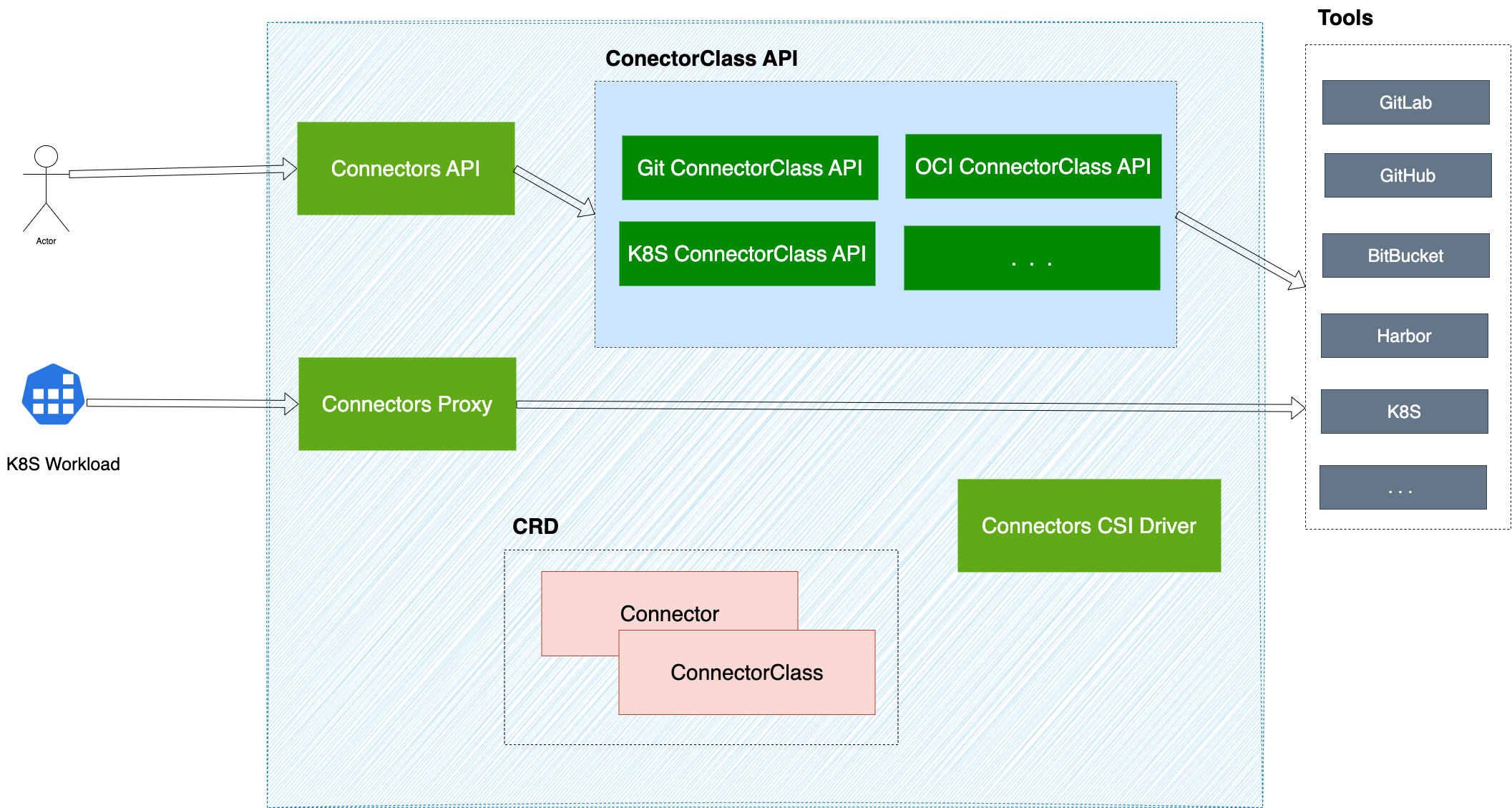Architecture

TOC
Connector
Connector is a resource that represents an integrated instance of a specific tool. By configuring the tool's access URL and authentication information, we can create an instance for the tool's integration.
For example, integrating https://github.com using a GitHub Private Access Token is achieved through a Connector.
In Kubernetes, Connector is a namespace-level custom resource. Users can create multiple Connectors within the same namespace to integrate different tools.
For instance, within the default namespace, it is possible to create both a Connector for integrating https://github.com and a Connector for integrating https://hub.docker.com/.
Platform administrators can manage tool integrations across the cluster by managing Connector resources.
ConnectorClass
ConnectorClass defines the access methods and behavior specifications for specific types of tools. It stipulates the parameters required when integrating with a certain type of tool, such as tool address and authentication information.
For example, the Git ConnectorClass defines the configuration items that need to be provided when integrating with Git tools, including the Git service's address and Basic-Auth authentication information.
In Kubernetes, ConnectorClass is a cluster-level custom resource. Developers can extend the types of tools supported by the platform by defining new ConnectorClasses.
For example, a Harbor ConnectorClass can be defined to support integration with the Harbor image repository, a MySQL ConnectorClass can be defined to support integration with MySQL databases, or a Jira ConnectorClass can be defined to support integration with Jira project management tools.
Connectors Proxy
ConnectorsProxy is a core component of the Connectors system that provides a secure, secretless way to access integrated tools within a Kubernetes cluster. It acts as a proxy server that handles authentication and routing of requests to the actual tool endpoints.
ConnectorsProxy enables clients to access tool resources without needing to handle authentication credentials directly. This significantly improves security by:
- Eliminates the need to distribute tool credentials directly to clients by using short-lived tokens issued by ServiceAccount.
- Preventing credential exposure in logs or environment variables
- Centralizing credential management
It supports various protocols and can handle different types of tool integrations:
- HTTP/HTTPS protocols for REST APIs
- Git protocol witch HTTP Basic Auth for code repositories server (e.g. GitHub, GitLab)
- OCI protocol witch Bearar Token Authorization for OCI registries (e.g. Harbor, Docker Registry)
More information: Connectors Proxy
Connectors API
Connectors API provides capabilities for accessing internal tool resources based on Connector instances. For example, for a Git Connector, the Connectors API can retrieve the list of branches (References) in a Git repository.
Developers can conveniently access resources within tools via the Connectors API without needing to concern themselves with specific tool addresses and authentication details.
This API is very useful in practical applications, such as:
- Retrieving the list of tags for container images when creating applications
- Getting the list of branches (References) for a code repository during a Git Clone operation
The implementation of the Connectors API is based on the underlying capabilities provided by the ConnectorClass API.
ConnectorClass API
ConnectorClass API defines the APIs provided by specific types of tools.
Different types of tools can offer various API capabilities, for example:
- The
Git ConnectorClass APIcan provide the capability to retrieve the list of branches for a code repository - The
OCI ConnectorClass APIcan provide the capability to retrieve the list of tags for artifact repositories
Developers can define unique API capabilities for each ConnectorClass, and these capabilities will ultimately be exposed to clients through the Connectors API.
Connectors CSI Driver
To facilitate easier utilization of Connectors-Proxy capabilities by K8S workloads, we can use the Connectors CSI Driver.
The Connectors CSI Driver can mount the rendered contents of the configuration file templates maintained within the ConnectorClass into the workload. The configuration file can include information for accessing the Connectors Proxy, enabling users to utilize Connectors Proxy capabilities with minimal modifications to their original scripts.
For more information, refer to connectors csi driver